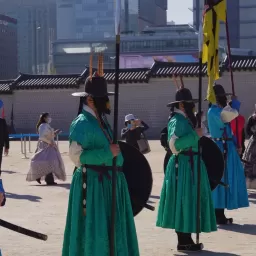Festivals And Celebrations
South Korea has a rich cultural heritage, and its festivals reflect a blend of traditional customs and modern celebrations.
 Bonus: Korean Culture:
Korean culture is a blend of tradition and modernity, preserving its heritage while embracing contemporary influences. Let’s learn more about it.
Bonus: Korean Culture:
Korean culture is a blend of tradition and modernity, preserving its heritage while embracing contemporary influences. Let’s learn more about it.
South Korea has a rich cultural heritage, and its festivals reflect a blend of traditional customs and modern celebrations. Here are some key festivals and celebrations in Korea:
-
Seollal (ì„¤ë‚ - Lunar New Year):
- Seollal is one of the most significant traditional holidays in Korea and marks the beginning of the lunar new year.
- Families come together to celebrate with ancestral rites (Charye) and pay respects to their elders. It is a time for family reunions and honoring ancestors.
- Traditional games like Yutnori (a board game) are played, and traditional foods like Tteok (rice cakes) are prepared.
-
Chuseok (ì¶”ì„ - Harvest Festival):
- Chuseok is often referred to as Korean Thanksgiving Day and is celebrated in late September or early October.
- It’s a time to give thanks for the harvest and pay respects to ancestors. Families visit ancestral graves and perform rituals known as Charye.
- Folk games, dance performances, and activities like Ganggangsullae (a traditional circle dance) are popular during Chuseok.
-
Buddha’s Birthday (ì„ê°€íƒ„ì‹ ì¼ - Seokga Tansinil):
- Celebrated on the eighth day of the fourth month of the lunar calendar, this festival honors the birth of Siddhartha Gautama, the founder of Buddhism.
- Temples are adorned with colorful lanterns, and parades featuring giant lantern floats take place. People often engage in acts of kindness, like releasing captive animals, as part of the celebration.
-
Dano (단오):
- Dano is a traditional Korean holiday celebrated on the fifth day of the fifth lunar month.
- It involves various folk games, rituals, and activities such as swinging on swings and performing mask dances. People often wear colorful Hanbok (traditional Korean clothing) during the festivities.
-
Jeongwol Daeboreum (ì •ì›” 대보름):
- Celebrated on the 15th day of the lunar new year, Jeongwol Daeboreum marks the first full moon of the lunar calendar year.
- Traditional customs include the eating of special foods like Ogokbap (a dish made with five grains) and the flying of large kites for good luck.
-
Gimjang (김장 - Kimchi-making Season):
- While not a festival in the traditional sense, Gimjang is a significant cultural event where families and communities come together to make kimchi for the winter.
- Kimjang usually takes place in late fall, and the process of preparing and storing kimchi is a communal activity.
These festivals offer a glimpse into Korea’s cultural heritage, providing locals and visitors alike with opportunities to experience traditional customs, performances, and delicious culinary delights.